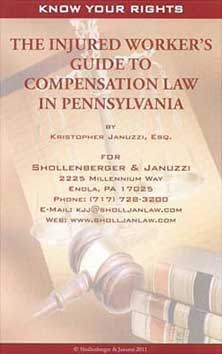Advocating For The Rights Of Injured Workers
If you have been injured at work, the attorneys of Shollenberger Januzzi & Wolfe, LLP, offer a free initial consultation to discuss your case. Whether you hire us to represent you or not, we’ll take the time to answer your questions and explain how to protect your rights. With offices in Harrisburg and Enola, we represent injured workers throughout central Pennsylvania.
We do not charge any fees for advising you. We never charge a fee of any kind unless you retain our services and our lawyers are successful in obtaining benefits for you.
The following pages provide more information about workers’ compensation benefits in Pennsylvania:
- Workplace accidents: If you’ve been injured in an accident, you should notify your employer promptly and get medical attention.
- Construction accidents: Many construction accidents involve both a workers’ compensation claim and a personal injury claim.
- Job-related vehicle accidents: If the accident was caused by someone else, you may have both a workers’ compensation claim and a personal injury claim against the driver who hit you.
- Industrial product defects: If your injury was caused by dangerous or defective equipment, you may have a claim against the manufacturer in addition to your workers’ compensation claim.
- Independent contractor claims: Many workers who operate as independent contractors may be regarded as employees for the purposes of workers’ compensation eligibility.
- Workplace injuries: We represent clients who have sustained all types of injuries on the job, from back injuries to repetitive stress injuries.
- Filing workers’ compensation claims: An early consultation with an attorney can prevent you from making mistakes that may damage your claim.
If your injuries are serious enough to keep you out of work for a year or longer, our lawyers can assist you with applying for Social Security Disability or other disability benefits.
Pennsylvania Workers’ Compensation FAQs
Our Pennsylvania workers’ compensation attorneys have represented thousands of clients for over three decades. Here are some questions we frequently answer:
How soon should I report a workplace injury?
While you have 120 days to make an official report of your injury to your employer, supervisor or manager, it benefits you to make a report immediately. Delays in making an injury report can create delays if you make a workers’ compensation claim.
How long do workers’ compensation benefits last in Pennsylvania?
Injured workers are entitled to medical benefits for work-related injuries and illnesses through workers’ compensation for as long as it is deemed medically necessary. The length of time you can collect wage loss benefits varies according to your injuries, but you can generally collect wage loss benefits for as long as you are deemed unable to work due to your injuries, for a maximum of 500 weeks. However, if a physician determines your work injuries to have impaired you at a level equal to or greater than 35% of a total body disability, you would be entitled to permanent compensation benefits.
Is everyone covered under workers’ compensation in Pennsylvania?
Most employees in Pennsylvania are eligible for workers’ compensation benefits. Workers exempt from these benefits are those who are already covered or receiving benefits, those who request an exemption on religious grounds, executive officers who request an exemption and some real estate salespeople.
How is workers’ compensation calculated in Pennsylvania?
Typically, workers’ compensation provides injured employees with two-thirds of their average weekly wage in benefits. Exceptions to this would include independent contractors and certain other workers, such as babysitting and agricultural workers who work less than 30 days per year. The test for determining who is an independent contractor is very specific and technical, and it is best to speak with an experienced workers’ compensation attorney to review this analysis.
Can my workers’ compensation benefits be changed or terminated?
There are many ways workers’ compensation benefits can be altered or denied. For example, if it is believed that an employee can work despite their injuries, then an insurer may try to lower or terminate benefits. If you are at risk of losing your workers’ compensation benefits, you can reach out to one of our attorneys to represent your interests.
Is there a difference between third-party claims and workers’ compensation claims?
Workers’ compensation is a no-fault system, meaning the fault of an injury does not need to be proven to gain benefits. It is generally an injured employee’s exclusive remedy against their employer. A third-party claim is a personal injury suit against any other party who contributed to your injuries, but it requires proof of fault.
Work With An Attorney Who Specializes In Workers’ Compensation Law
Attorney Karl Januzzi is a certified specialist in workers’ compensation law (as authorized by the Pennsylvania Supreme Court) through the Pennsylvania Bar Association Section on Workers’ Compensation Law. He is widely recognized as one of central Pennsylvania’s foremost attorneys in this area of law. He has also served as a lecturer for the Pennsylvania Association for Justice, educating other attorneys about the 1996 amendments to the state’s workers’ compensation law.
Contact Our Pennsylvania Workplace Injury Attorneys To Get Started On Your Claim
For trusted advice about your legal options after a workplace injury, call our Harrisburg or Enola office at 717-229-6580 or complete our online contact form for a free consultation. We offer a free Injured Workers’ Guide to Compensation Law in Pennsylvania.

